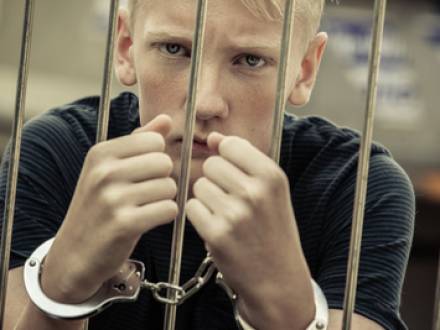New Maryland Bill Limits Juveniles Being Charged as Adults
 A new Maryland bill introduced by a Democratic Senator would raise the age at which a juvenile can be tried as an adult from 14 to 16. Senate Bill 422 would also eliminate a number of juvenile crimes for which 16-year-olds are currently eligible to be charged as adults. One criminal justice advocate stated that the juvenile system operates under the "basic understanding that children should be treated differently."
A new Maryland bill introduced by a Democratic Senator would raise the age at which a juvenile can be tried as an adult from 14 to 16. Senate Bill 422 would also eliminate a number of juvenile crimes for which 16-year-olds are currently eligible to be charged as adults. One criminal justice advocate stated that the juvenile system operates under the "basic understanding that children should be treated differently."
This proposed bill comes less than a year after Maryland lawmakers passed a juvenile justice reform bill that went into effect on November 1, 2024. Under the new bill, minors 16 and older who are charged with a crime (first-degree murder, voluntary manslaughter, carjacking, first-degree rape) that could bring a life sentence would still be tried in adult court. Other crimes for those under 16 would go through juvenile court.
Currently, Maryland ranks second, behind Alabama, for the number of teens between the ages of 14 and 17 who are automatically sent to adult court. In 2022, about 12 percent of teens tried as adults were convicted. It can be devastating for a parent to learn his or her child has been accused of a criminal offense. Speaking to an experienced Silver Spring, MD juvenile crimes attorney can make a difference in the outcome.
What Happens When a Minor is Charged in Juvenile Court?
A minor (generally under the age of 18) is said to have committed a "delinquent act" rather than a criminal offense. No crime can be charged against a child who is under the age of 10. Following a complaint or arrest, the child will be brought to a Department of Juvenile Services (DJS) intake office.
The intake officer must determine whether judicial action is warranted and is in the child’s best interests. If a police officer asks for the child to be detained, the inquiry must occur within two days. The following questions will be asked by the intake officer:
- Does the child have any alcohol or drug use issues?
- What type of home, community, and school environment does the child have?
- Does the child have a prior history of juvenile delinquency?
From this point, the juvenile intake officer will either authorize or refuse a peace order request or petition. He or she may also propose an informal adjustment of the matter. The DJS intake officer must also discuss a mental health referral with the child’s parents within 25 days after the complaint is received. A follow-up to ensure the parents complied with the mental health referral will occur 15 days afterward.
If the intake officer proposes an informal adjustment of the issue, this means an informal process rather than a judicial intervention is believed to be in the best interests of the child and the public. Informal adjustment can include completion of community service, referrals to other agencies, individual and/or family counseling, substance abuse treatment, restitution, and other types of nonjudicial intervention.
An informal adjustment may not exceed 90 days. If court action is determined to be necessary, the case may be referred to the State’s Attorney’s Office. Within 30 days from the intake officer’s referral, the petition alleging delinquency must be filed. A child may only be taken into custody in the following situations:
- A court order
- A lawful arrest
- Emergency protection if the child is in immediate danger
- When the child is a runaway
The parent or guardian must be immediately notified of the child’s location, the reason the child is in custody, and instructions for making contact with the child. Juvenile court includes a preliminary hearing, an adjudicatory hearing, and a disposition hearing to determine treatment or rehabilitation plans.
Contact a Montgomery County, MD Juvenile Crimes Lawyer
If your child has been charged with a crime, it is extremely important that you speak to a knowledgeable Silver Spring, MD juvenile crimes lawyer from The Law Offices of Gerstenfield & Demirji, PC. as quickly as possible. Our attorneys have excellent relationships with prosecutors and judges, treat our clients with warmth and compassion while aggressively defending their rights, and are available 24/7. Call 301-589-9500 to schedule your free consultation. We are fluent in Arabic and Spanish.














